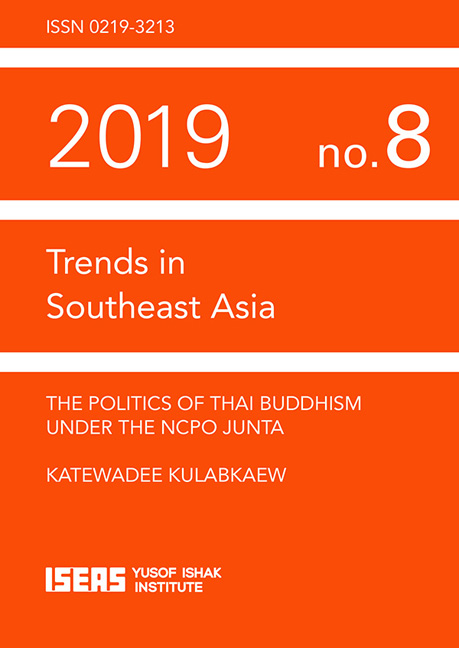The Politics of Thai Buddhism under the NCPO Junta
Published online by Cambridge University Press: 04 February 2020
Summary
INTRODUCTION
The past two decades have been tumultuous in Thailand's religious affairs. Disputes, debates and controversies concerning the administration of Buddhism, the country's national religion by tradition, have erupted more and more frequently. This chronic and unresolvable conflict originates from Thai Buddhists’ inability to achieve a broad consensus on religious reform.
Tensions have escalated as the Sangha—the Buddhist monastic order—has found itself at odds with government authorities over the process of negotiating reform. Monks’ growing inclination to concern themselves with politics and activities that aim to protect monastic interests have displeased sections of the Thai establishment. As a result, the Thai state has recently sought to assert more control over Buddhist affairs in general and the Sangha in particular.
However, under the National Council for Peace and Order (NCPO) junta that came to power in 2014, the fierce struggle concerning Buddhist reform had seemed to subside. The military junta put an end to some of the prolonged religious controversies and even enforced the Sangha reform measures that former military and democratic governments had failed to uphold.
Upholding and protecting Buddhism might be a duty of traditional Thai rulers, in their desire for political legitimacy, but the NCPO's decisive actions concerning the institutional reform of Buddhism are rooted not merely in respect for this tradition. Thai society today might not find the legitimation of political power through the defence of Buddhism to be as persuasive as in the past.
Indeed, what the NCPO did in the area of Buddhist reform during its almost half-decade-long rule reflected a political decision. That decision had been closely intertwined with the dynamic of contending forces in Thailand's long-troubled religious politics. The background of long-term contentions between lay religious nationalists and the Sangha convinced the military government to act, for the sake of national security and the stability of its regime.
PERPETUAL CRISIS: THE PROBLEMATIC STATE OF THAI BUDDHISM
Why do Thai Buddhists and the notionally secular state have to concern themselves with the issue of religious reform? The answer lies in the long-running discourse of “Buddhism in crisis” that has been propagated and continually revived in Thai society since at least the late 1970s.
- Type
- Chapter
- Information
- The Politics of Thai Buddhism under the NCPO Junta , pp. 1 - 18Publisher: ISEAS–Yusof Ishak InstitutePrint publication year: 2019



